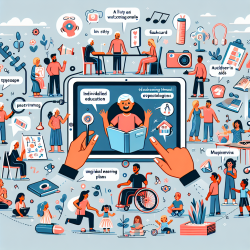Introduction
The stigma surrounding mental illness is not just a societal issue but also prevalent within the healthcare system. The research article "Exploring the Knowledge, Attitudes, and Behavioural Responses of Healthcare Students towards Mental Illnesses—A Qualitative Study" provides valuable insights into the perceptions and attitudes of healthcare students, who are the future of medical care. This blog explores how practitioners can improve their skills by implementing the outcomes of this study or by engaging in further research.
Understanding Stigma in Healthcare
The study highlights that while healthcare students possess a well-rounded understanding of mental health, some still hold stigmatizing attitudes. This stigma can negatively impact patient care, leading to delays in help-seeking and suboptimal therapeutic relationships. As practitioners, recognizing and addressing these biases is crucial for improving patient outcomes.
Key Themes and Practitioner Insights
The research identified four main themes:
- General Perceptions: Students showed both positive and negative perceptions of mental illnesses. Understanding these perceptions can help practitioners tailor their approach to mental health education.
- Contact Experiences: Direct contact with individuals with mental illnesses often led to positive transformations in students' perceptions. Practitioners can foster similar experiences through community engagement and patient interactions.
- Mental Illness in Healthcare Settings: The study found that students felt less equipped to handle severe mental illnesses. Practitioners can bridge this gap by seeking continuous education and training.
- Learning in Healthcare Academia: Students reported insufficient mental health education in their programs. Practitioners can advocate for curriculum changes that emphasize mental health training.
Implementing Research Outcomes
Practitioners can enhance their skills by incorporating the following strategies:
- Self-Reflection: Regularly assess personal biases and attitudes towards mental illness to ensure they do not affect patient care.
- Continuing Education: Engage in workshops, webinars, and conferences focused on mental health to stay informed about best practices.
- Patient Engagement: Create opportunities for meaningful interactions with patients experiencing mental health issues to build empathy and understanding.
- Advocacy: Work towards integrating comprehensive mental health education into healthcare training programs.
Encouraging Further Research
To deepen understanding and improve practices, practitioners are encouraged to conduct or participate in further research. This could include exploring the impact of stigma on different healthcare disciplines or evaluating the effectiveness of various educational interventions.
Conclusion
Addressing mental illness stigma in healthcare requires a concerted effort from both current practitioners and those in training. By implementing the insights from this study and engaging in ongoing research, healthcare professionals can improve their skills and provide better care for individuals with mental illnesses.
To read the original research paper, please follow this link: Exploring the Knowledge, Attitudes, and Behavioural Responses of Healthcare Students towards Mental Illnesses—A Qualitative Study.










